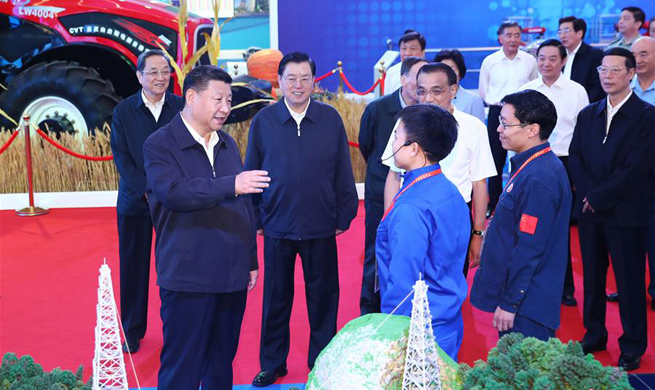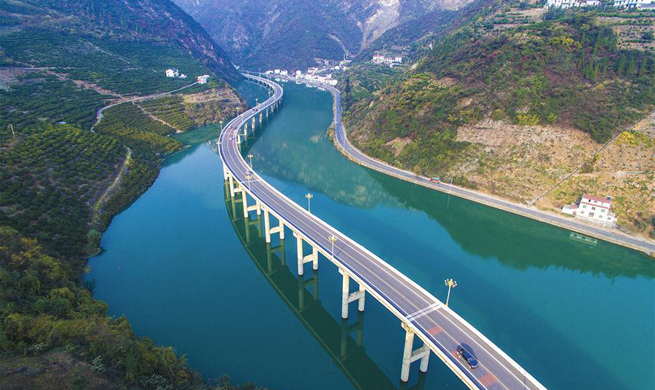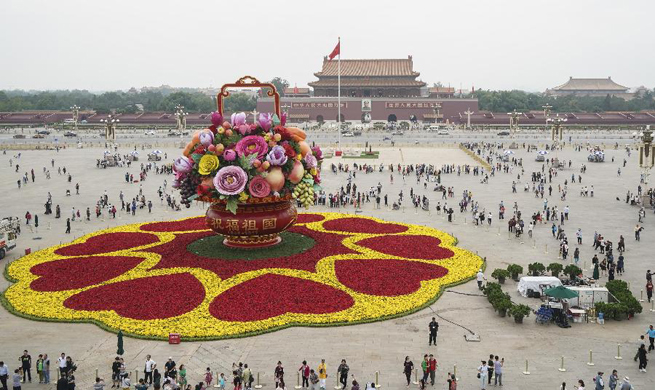by Keren Setton
JERUSALEM, Sept. 26 (Xinhua) -- The Israeli-Palestinian conflict, which has previously dominated the discourse at the annual UN General Assembly (UNGA) session, seemed to be brushed aside this year.
Apart from a speech by Palestinian President Mahmoud Abbas focusing on the thorny topic, it was almost absent throughout the UN session, except for a brief mention of the conflict by Israeli Prime Minister Benjamin Netanyahu.
Sounding almost like an afterthought, Netanyahu said his country was "committed to achieving peace with all our Arab neighbors, including the Palestinians."
The Israeli leader did not even go into any details on the way to solve the conflict.
"As long as he (Netanyahu) is in power, he will try to make it a non-issue domestically and more significantly in the international arena," said Nimrod Goren, head of Mitvim, the Israeli Institute for Regional Foreign Policies.
"Israel is trying to de-link it's foreign relations from the Israeli-Palestinian conflict and it goes very harshly against those actors that try to do this linkage," he noted.
With more pressing issues on the international agenda and in the Middle East region in particular, the decades-long conflict is now regarded as a given at least for the near future, since all sides are resigned to believing it is insoluble.
For Netanyahu, this is already a success.
U.S. President Donald Trump did not even mention the conflict in his speech.
In the past, it was an international consensus that the two-state solution was the only way to solve the conflict.
But after years of implying by the Netanyahu government that a Palestinian state is off the table, the new U.S. administration led by Trump has eventually dealt a lethal blow to the idea of Palestinian statehood.
In his speech, Abbas warned that the two-state solution was "in jeopardy" and that there is "no place left for Palestine" in the light of Israeli settlement activities in territories it occupied after the 1967 Middle East war.
At the last year's UNGA session, the Palestinian issue was prominent on the agenda.
It took place in the final days in office of former U.S. President Barack Obama, who was a staunch supporter of Palestinian statehood.
At the time, Netanyahu felt the pressure to make a commitment to the two-state solution while standing at the UN podium. His government feared Obama was going to take steps to promote a binding UN resolution against Israel.
But Goren doubts his sincerity then.
"The question is whether he's ever believed in the two-state solution. What did he mean when he talked about the two-state solution?" the Israeli expert asked.
And now, with the backing of Trump, Netanyahu can shed the mask and dispense with the lip service.
"If the American President is not talking about the two-state solution, Netanyahu feels that he has no obligation to do so himself," said Goren. "He is trying to reflect the notion that the Palestinian issue is not of high relevance anymore."
The Israeli prime minister devoted the bulk of his speech to the threat of the Iranian nuclear program.
"Netanyahu turned the Iranian threat into the be-all and end-all of his policies, pushing the Palestinian issue off the public agenda," wrote Mazal Mualem, a columnist for the Al-Monitor website.
She added that the Israeli leader views his UN appearance as a "huge success."
In recent months, U.S. envoys have been shuttling between Ramallah and Jerusalem in an attempt to jump-start the stalled peace process between Israelis and Palestinians.
However, no real progress seems to have been made and the impression is that the U.S. administration is not exerting its full power behind the issue.
For Netanyahu, this guarantees his political survival as the leader of a right-wing ultra-nationalist coalition which largely opposes Palestinian statehood.
"The current right-wing government of Israeli wants the status quo that enables it to maintain control over the lands and even increase its ability to have influence on the Palestinian territories," Goren noted.
But while Abbas took to the podium and made his obligatory warnings about the demise of Palestinian hopes, he himself is in the midst of internal political turmoil.
The Palestinian president is coping with a reconciliation with his rivals in the Hamas movement. Such a deal may threaten the stability of his regime, as Hamas is thought to be more popular even in the territories Abbas controls.
Actually "both leaders benefit from the issue becoming less relevant on the international community," Goren pointed out.
But ultimately, the peace progress may be what Abbas really needs in order to regain support from his people.
And for Netanyahu, who may be resisting the urge to pat himself on the back for the moment, troubling times are probably ahead.
Putting aside several criminal investigations being conducted against him by Israeli police, the cyclical nature of the conflict with the Palestinians means a new wave of violence is just around the corner, with the exact timing just unknown.
















